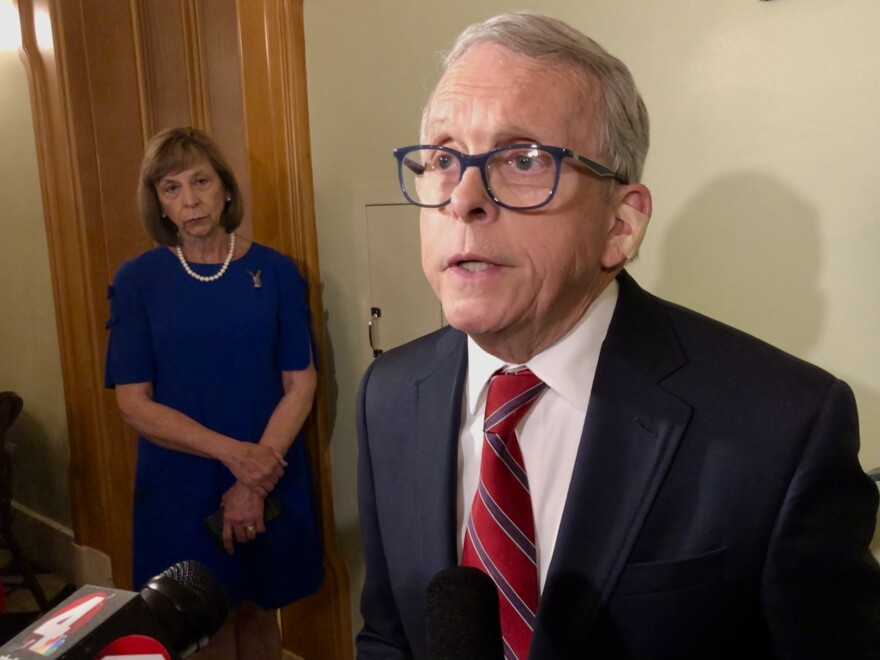After offering prayers and words of support for the families that lost loved ones in the Uvalde, Texas school shooting, Gov. Mike DeWine proposed what he believed would be measures that could increase school safety in Ohio.
DeWine, a Republican, said he plans on asking the Republican-dominated state legislature for increased funding to help schools fortify their buildings.
“Parents should be able to know that when they send their child to a school, whether it’s a public school or a private school in the state of Ohio, doesn't matter where they live, they should be assured that that school building is up to the highest standards,” said DeWine.
Ohio has thousands of school buildings and while he doesn’t know the exact dollar amount yet, DeWine said the increased funding would be a “significant amount of money.”
DeWine also intends to increase the number of regional school safety liaisons in Ohio to help local school districts develop emergency response plans. The Ohio Department of Education and Ohio Department of Public Safety, at DeWine’s direction, will provide all school personnel with comprehensive behavioral threat assessment training. DeWine said that training will help educators identify students who might pose a risk to themselves or others.
“When we’re dealing with our children’s lives we need to be able to be willing, we must be willing to spend the money we need to spend,” said DeWine.
When it comes to gun-related policies, DeWine mentioned the work Ohio has done to increase reports entered into the gun background check database and his push for a bill to increase penalties for repeat, violent crime offenders.
DeWine also said there could be support for safety protection orders, a process to confiscate firearms from someone deemed to be a threat to themselves or others.
“If we follow due process and have adequate due process. I think this is something that the General Assembly can work out,” said DeWine.
But DeWine did not bring up other gun regulations that have been broadly supported by anti-gun violence advocates, such as universal background checks.
DeWine proposed expanded background checks, safety protection orders, and other gun regulations in August 2019 after the Dayton mass shooting where nine victims were killed. The day after that shooting, DeWine addressed mourners at a vigil where he was greeted by people chanting “do something.”
DeWine’s proposed gun regulations did not move in the Ohio Legislature during the rest of 2019 and then the COVID-19 pandemic became the focal point of the administration in 2020.
On Friday, DeWine was asked if the proposals he laid out for school safety would answer the call to “do something.” He stopped short of answering the question and instead said he looks to propose legislation that can be effective and pass the legislature.
“Look, my job is to get as much done as I can that will actually get done. And I could, you know, get up and give speeches every day about certain things. But if there's no chance that they're going to happen, I'm wasting everybody's time and misleading people,” said DeWine.
DeWine, when asked about the value of speaking out on issues even if the legislature doesn't support it, said "I don't think people want false hope. I think what people want is for a leader to tell them the truth about what's doable and what's not doable."
Watch: DeWine on proposing gun regulations in the Ohio Legislature
Democratic nominee for Ohio Governor Nan Whaley — who’s running against DeWine this November — was the mayor of Dayton and joined DeWine during that vigil. Whaley has called for gun regulations that she says could decrease gun violence in Ohio.
"If not for our children and our neighbors, when is the right time to stand up and fight to make our communities safer? Let me be clear: this in no way adequately answers the calls of Daytonians and so many families across our state to 'do something.' This abdication of leadership and Governor DeWine's failure to keep his promises is pathetic," Whaley said in a statement.
The Ohio Legislature is expected to go on a long break in mid-June. DeWine suggested some of his proposals could move quickly through the legislature before they go into recess for the summer.





